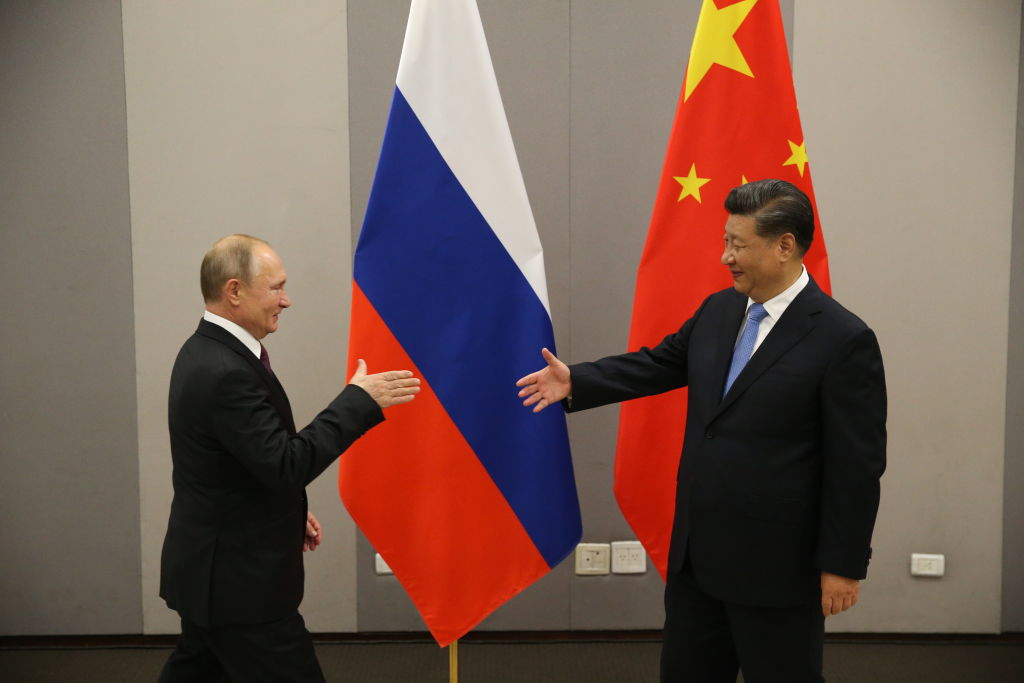
Russian President Vladimir Putin thought he could quickly capture Kyiv and replace Ukraine’s government. Whether he was misled by poor intelligence or by his own fantasies about history, his ‘smash and grab’ failed in the face of effective Ukrainian resistance. He then turned to a brutal bombardment of cities like Mariupol and Kharkiv to terrorise the civilian population into submission—as he had previously done in Grozny and Aleppo. The tragic upshot is that Ukraine’s heroic resistance has been accompanied by increasing civilian suffering.
Is there any way to end this nightmare quickly? One possibility is for Chinese President Xi Jinping to see that he has a ‘Teddy Roosevelt moment’. After the brutal war between Russia and Japan in 1905, Roosevelt stepped in to mediate. He pressed hard for the parties to compromise and ultimately prevailed, thereby boosting America’s global influence and winning himself a Nobel Peace Prize.
Turkey, Israel and France (among others) are attempting to mediate in Russia’s current war, but they don’t have nearly as much leverage with Putin as his ally Xi does. The question is whether Xi has the imagination and the courage to use it.
The answer, thus far, is no. While China has long portrayed itself as a defender of the principles of sovereignty and territorial integrity, it has tolerated Putin’s brazen violation of the United Nations charter. When the UN Security Council voted on a resolution condemning Russia’s invasion, China abstained. China has criticised Western sanctions against Russia and parroted Russian propaganda about the war being caused by America’s own plans to pursue NATO enlargement, even though it had been clear for years that NATO members weren’t going to vote to admit Ukraine.
China’s unwillingness to criticise Russia has left it sitting on the diplomatic sidelines, unable to wield influence commensurate with its growing economic and military strength. Although Chinese censors limit most news about the war, some in Beijing have openly wondered whether China’s current diplomatic stance best serves its national interests. For example, Wang Huiyao, the president of the Center for China and Globalization in Beijing, has
suggested that China should mediate to give Putin an ‘off-ramp’ from his disastrous Ukraine policy.
Why might this be in China’s interest? For one thing, China’s position undermines its claim to be a defender of sovereignty, which it uses to appeal to its neighbours in Southeast Asia. Equally important, the war is blunting China’s soft power in Europe, which accounts for five times more of China’s trade than Russia does. The war has also driven up the price of China’s oil and grain imports. Grain prices will become even more salient if China experiences the same degree of severe flooding that it did last year.
As the war drags on and Western sanctions increase, there’s also a danger that secondary sanctions will spill over and harm China. Providing Putin with a face-saving off-ramp could address this and the other dangers the war poses. And it would deepen Russia’s growing dependence on China and boost China’s own global image and standing. Xi might even win a Nobel Peace Prize.
Of course, there would be costs associated with such an initiative. Cautious Chinese diplomats see the war in Ukraine as a decidedly European conflict. If it saps the strength of older powers such as Europe, the US and Russia, China can benefit by standing back and letting the conflict burn itself out. Moreover, although the war is weakening an ally (a potential cost), it also has changed the global political agenda in ways that are advantageous to China. No longer can the US talk about a pivot to Asia, where it would focus its attention on China.
After the 2008 financial crisis, Chinese leaders concluded that the US was in decline, and that led them to abandon Deng Xiaoping’s patient and cautious foreign policy. Nationalism has since been rising in the country, and Xi has expressed the hope that China will decisively displace the US geopolitically by 2049—the centennial of the People’s Republic.
The primary obstacle to Xi’s dream is of course the US, followed by China’s lack of allies other than Russia. Xi and Putin have forged a personal relationship that has reinforced what was previously an alliance of convenience. Even if the war in Ukraine has made that alliance somewhat less convenient, Xi may still feel that it’s prudent to ‘dance with the one who brought you to the party’.
Besides, initiating a Rooseveltian move would probably require more imagination and flexibility than the Chinese leadership is capable of. One also must consider a domestic political element that a Chinese friend recently pointed out to me: with Xi seeking a third presidential term this year, what matters most to him is maintaining the Chinese Communist Party’s control of the country and his own control of the party.
As economic growth has slowed, the party has increasingly relied on nationalism to legitimise its rule. That’s why Chinese official media and nationalistic websites have repeated Putin’s claims that Ukraine is a puppet of the West and that Russia is standing up to America’s bullying of both Russia and China. Support for Putin’s war is in keeping with China’s nationalist ‘wolf-warrior diplomacy’.
But while Putin’s invasion has upended world politics, it has not changed the underlying balance of power. If anything, it has slightly strengthened the US position. NATO and America’s alliances have been reinforced, with Germany embracing a far more muscular defence posture than at any time in decades. Meanwhile, Russia’s reputation as a formidable military power has suffered a serious blow. Its economy is weakened, and its soft power lies in tatters. China can no longer tout the alliance of autocracies as proof that the East wind is prevailing over the West.
China could still change the dynamic by seizing its Teddy Roosevelt opportunity. But I doubt that it will.
 Print This Post
Print This Post